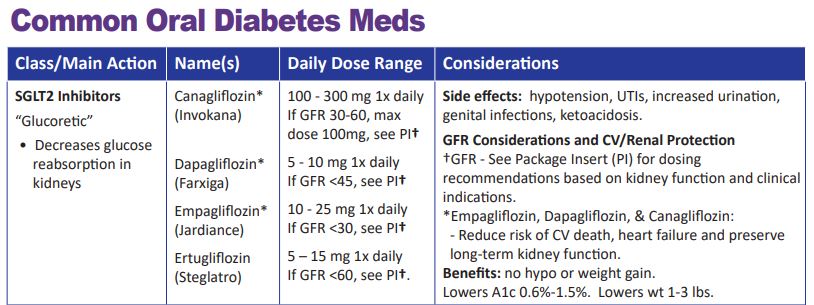Did you know that Toujeo U-300 insulin pens are good for 56 days once opened? And that the max dose for Tresiba U-200 FlexTouch Pen is 160 units?
For our latest version of our printed PocketCards, we now include the number of pens in a box, max injection dose, total insulin amount per pen, and shelf life on the Concentrated Insulin Card. We also added Lyumjev KwikPen u200 insulin.
When determining the best insulin for people taking concentrated insulins, shelf life, max dosing, and total units of insulin in each device are important considerations.
We have also updated the GFR parameters for SGLT2 Inhibitors. This class of medication not only substantially lowers blood glucose but also has a profound impact on renal protection.
As more trial data become available, the GFR cutoff levels may change, so periodically refer to the package insert (PI) or our DES electronic pocket care version, for the most up-to-date information.
We update the printed version of our PocketCard once or twice a year.
We update our electronic PocketCard on an ongoing basis.
Fortunately, we can immediately update our electronic version of the PocketCard on our website and CDCES Coach App to reflect the latest medication recommendations and guidelines. In the electronic version, we also include that the GLP-1 Exenatide (Bydureon) is now approved for peds, age 10 and older and the GFR cut-off for empagliflozin is now approved for a GFR 30 or greater (please see package insert for details).
Preparing for the BC-ADM Exam Free Webinar – What you need to know

Becoming Board Certified in Advanced Diabetes Management (BC-ADM) provides an opportunity for diabetes specialists with an advanced degree in their field (plus a professional license as an advanced practice nurse, registered dietitian, registered pharmacist, or provider) to increase the breadth and depth of their diabetes knowledge. The scope of advanced diabetes practice includes management skills such as medication adjustment, medical nutrition therapy, exercise planning, counseling for behavior management, and psychosocial issues.
Attaining optimal diabetes management includes using a person-centered approach coupled with assessment, screening, management, and monitoring of acute and chronic diabetes co conditions. This webinar will review changes in requirements for this year’s exam eligibility and test format, strategies to succeed along with a review of study tips and test-taking tactics. We will review sample test questions and the reasoning behind choosing the right answers. We hope you can join us for this webinar.
See Full Calendar for upcoming webinars and Training Conferences.
Can’t make it live? All paid registrants are guaranteed access to the video presentation, handouts and podcasts.
Sign up for Diabetes Blog Bytes – we post one daily Blog Byte from Monday to Friday. And of course, Tuesday is our Question of the Week. It’s Informative and FREE! Sign up below!
[yikes-mailchimp form=”1″]Accreditation: Diabetes Education Services is an approved provider by the California Board of Registered Nursing, Provider 12640, and Commission on Dietetic Registration (CDR), Provider DI002. Since these programs are approved by the CDR it satisfies the CE requirements for the CDCES regardless of your profession.
The use of DES products does not guarantee the successful passage of the CDCES exam. CBDCE does not endorse any preparatory or review materials for the CDCES exam, except for those published by CBDCE.










